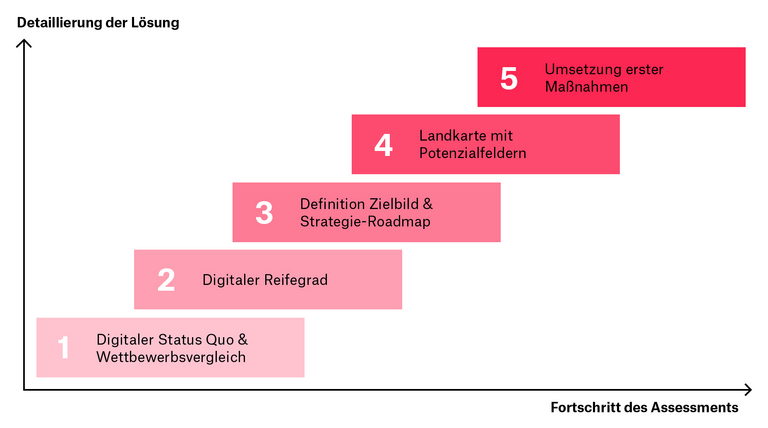

Digital Maturity Assessment
"Digitalisation affects all units of an organisation. A structured analysis is therefore the basis for a successful digital strategy. The Digital Maturity Assessment is the ideal starting point for a sustainable and holistic change process."
On the path to digital transformation with the Digital Maturity Assessment
In an era where digitalisation is revolutionising the business world, companies and organisations face the challenge of understanding and systematically managing their digital maturity. Digital transformation has long since become a fundamental necessity in order to succeed in a highly competitive landscape. In this context, the Digital Maturity Assessment is proving to be an indispensable tool. In this article, we deepen our understanding of the importance of digitalisation and shed light on the key issues surrounding digital maturity assessment.
What is digital maturity?
A high level of digital maturity means that an organisation is effectively using advanced digital technologies and strategies to achieve its business goals. This may mean that it uses innovative digital solutions for customer communication, makes data-driven decisions, implements digital processes to increase efficiency or is able to adapt flexibly to the ever-changing digital landscape. A low level of digital maturity, on the other hand, indicates that an organisation is still at the beginning of its digital transformation or only makes limited use of digital technologies. At this stage, it can be difficult for an organisation to assert itself in the digital business world and remain competitive.
How does the Digital Maturity Assessment support the transformation process?
Digital transformation is a complex process that affects many aspects of an organisation. The Digital Maturity Assessment provides a clear roadmap for this transformation process. It helps to set priorities, deploy resources effectively and continuously monitor progress. It also makes it possible to initiate changes in the organisational culture and business processes and ensure that the entire workforce is involved in the transformation.

What role does the digital maturity model play in this process?
The individual digital maturity model forms the centrepiece of every digital maturity assessment. It enables a structured and comprehensive evaluation of a company's digital maturity level. This model not only identifies weaknesses, but also strengths and best practices that can serve as a basis for digital transformation. It creates a common understanding within the organisation and serves as a point of reference for the development of a tailored digital strategy.
What is the significance of digital communication in the context of digital maturity?
Digital communication is a crucial element in the context of digital maturity. It encompasses not only external communication with customers and partners, but also internal communication within the organisation. Effective digital communication makes a significant contribution to increasing the level of digital maturity and promoting acceptance of the digital transformation within the workforce. It is a key element in the development of a holistic digital strategy.
How can companies successfully shape their digital transformation?
Successfully shaping the digital transformation requires a deep understanding of your own digital maturity level and a clear strategic direction. The Digital Maturity Assessment, together with a clear Digital Maturity Model, provides the tools to manage and successfully implement this process.
Quick wins are an important component in the implementation of the digital strategy. These are measures or changes that can be implemented relatively quickly and deliver immediate positive results. Quick wins increase the momentum of change and acceptance for the digital transformation.
Identifying and implementing quick wins is an integral part of a successful transformation process.
Why is a Digital Maturity Assessment indispensable in the age of digitalisation?
In the age of digitalisation, a digital maturity assessment is of crucial importance as it helps organisations to evaluate their digital maturity level and develop targeted measures for digital transformation. Without a sound understanding of one's own level of maturity, it is difficult to tackle the complex challenges and opportunities of the digital world in a targeted manner. This assessment offers the opportunity to uncover the gaps in digital competences and processes and develop clear action plans to close these gaps.
"We work analytically and conceptually and attach great importance to the operationalisability of our concepts. Agile methods are not a dogma for us, but form the basis for developing customised solutions together with our customers."


